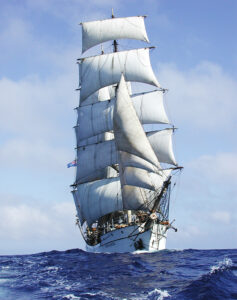Henry Opukahai’ia, the Founder of the Written Hawaiian Language and His Reincarnation in Indonesia as Handaka Vijjananda: Translators of Religious Texts-Christian and Buddhist, in Two Lifetimes
- CATEGORY
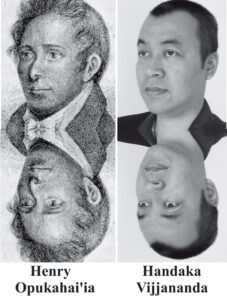 Revealed by: Spirit Being Ahtun Re in a Ryerson-Semkiw Reincarnation Research Session
Revealed by: Spirit Being Ahtun Re in a Ryerson-Semkiw Reincarnation Research Session
Article by: Walter Semkiw, MD
Click on images to enlarge
A Past Life for Handaka Vijjananda
In working on the Indonesian version of my book, Born Again, there was a person I wanted to determine a past life for. This individual is Handaka Vijjananda, who established the Ehipassiko Foundation, an organization dedicated to spreading the wisdom of Buddhism in that part of the world. His foundation translated and published my book in Indonesia. I am indebted to Brenda ie-McRae, a past life regression therapist in Jakarta, Indonesia, for indroducing me to him.
In working with Handaka, I found him to be a very impressive young man. He is trained as a pharmacist, runs a pharmaceutical export business, is a devoted father, yet makes time to translate and publish books on Buddhism.
Individuals tend to pursue similar activities from one lifetime to another and those who write books in one incarnation oftentimes have written books in prior incarnations. It is easier to locate past lifetimes that can be historically validated for writers, as they leave a record. Accordingly, I wondered about a past lifetime for Handaka.
In a session with Kevin Ryerson, Ahtun Re told me that Handaka had an incarnation as a native of Hawaii, who was involved in the creation of the written Hawaiian language. When I asked Ahtun Re how I would find this person, he told me that this individual is historically well known and that there is only one such individual.
Henry Opukaha’ia or Obookiah: A Founder of the Written Hawaiian Language
After doing some research, I found an article entitled, Henry Opukaha’ia: The Youth Who Changed Hawai’i, written by Betty Fullard-Leo, in which she wrote:
“The work Henry Opukaha’ia did on translating the Bible and recording the Hawaiian language in a grammar/dictionary/spelling book, paved the way for the missionaries to print the first Hawaiian primer and Bible stories in the Hawaiian language.”
I found a portrait of Henry and noted that he bore a resemblance to Handaka. In a subsequent session with Kevin Ryerson, I asked Ahtun Re if Handaka Vijjananda is the reincarnation of Henry Opukaha’ia. Ahtun Re affirmed the match.
When I passed this information on to Handaka, he and his family related to the match for reasons that will be explained in a moment. Let us first briefly review the life of this pioneer of the Hawaiian language.
Henry Opukaha’ia’s Early Life and Losses in Hawaii
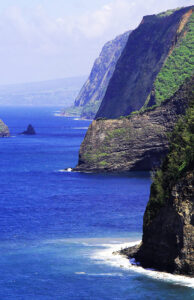 It is thought that Henry Opukaha’ia was born in 1792 on the Big Island of Hawaii. As a young boy, he grew up in the turmoil and war that followed the death of the old tribal ruler, Alap’i. His successor, Kamehameha, became the ruler of all the Hawaiian Islands, but who got involved in conflict over control of the Big Island.
It is thought that Henry Opukaha’ia was born in 1792 on the Big Island of Hawaii. As a young boy, he grew up in the turmoil and war that followed the death of the old tribal ruler, Alap’i. His successor, Kamehameha, became the ruler of all the Hawaiian Islands, but who got involved in conflict over control of the Big Island.
In this war between rival royal factions, Henry’s parents were killed. He later was adopted by an uncle who was a priest or “kahuna.” He later lost an aunt for her violation of a religious “kapu,” which means a taboo or religious rule that cannot be broken. Betty Fullard-Leo narrates the turn of events:
“Henry, who is thought to have been ten or twelve at the time, fled from the rampaging warriors carrying his infant brother on his back. A spear thrown by one of the soldiers found its mark, and the baby brother was killed. Henry survived, but the same soldier who had killed his parents became his guardian for the next year and a half.
During this time, Henry discovered that a kahuna at a nearby temple was his uncle, so he was allowed to go to live with his grandmother and this uncle. While he was visiting an aunt in a nearby village, soldiers came to take her prisoner for some infraction of the kapu system, but Henry once again survived by escaping through a hole in the grass house. While he watched, a soldier threw this aunt over a cliff to her death.”
Henry Opukaha’ia Sails for Connecticut on the “Triumph”
It is sad that Henry, orphaned by a tribal war, had to witness so much additional violence. It is understandable why he would want to leave Hawaii for a more peaceful place. When a ship named the Triumph came into port, the captain, a man named Brintnall, invited Henry and Hopo’o, another Hawaiian boy, to have dinner on the vessel and to spend the night.
Subsequently, Henry, at the age of 16, was allowed to stay on board and participate in the ship’s journeys. Regarding his travels on board the Triumph, Betty Fullard-Leo writes:
“The sailors called him Opukaha’ia Henry, and spelled his last name the way they pronounced it, Obookiah. During the next two years, Henry sailed on the Triumph to the Seal Islands (situated between Alaska and Japan), back to Hawai’i, to Macao, and around the Cape of Good Hope, landing in New York in 1809. On board he developed a friendship with a Christian sailor named Russell Hubbard, who began teaching Henry how to read and write, often using the Bible as a primer.”
When the ship landed in the United States, Henry moved to New Haven, Connecticut, to live with Captain Brintnall and his family. There he continued his education and learned about the Christian religion, which he found more appealing than his native Hawaiian religion, in which idols were worshiped. For a period of time, he lived with the very devout family of the president of Yale College. To earn a living, he worked on farms in Connecticut and New Hampshire, though he continued to study whenever possible.
Henry Converts to Christianity and Translates the Bible into Hawaiian
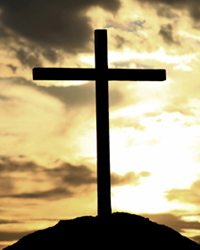 By 1814, Henry began speaking publicly at church groups in Connecticut. Further, he began translating the Bible into Hawaiian and he created a dictionary and grammar book in the Hawaiian language. Fullard-Leo, in her article, continues the story:
By 1814, Henry began speaking publicly at church groups in Connecticut. Further, he began translating the Bible into Hawaiian and he created a dictionary and grammar book in the Hawaiian language. Fullard-Leo, in her article, continues the story:
“People in Connecticut had begun to talk of sending missionaries to foreign countries-Hawai’i, in particular, as several young native Christians (like Henry) would be able to pave the way. Henry continued to fill his inquisitive mind with knowledge at Yale College. Not only did he undertake Latin, Hebrew, geometry and geography, he improved his English by writing the story of his life in a book called Memoirs of Henry Obookiah. By 1815, he had finished writing his personal history and had begun to keep a diary that detailed his feelings about his faith.”
At 26, Henry Dies Before He Could Return to Hawaii to Spread Christianity to the Islands
Henry then embarked on missionary training, so that he could spread the message of Christianity to his native Hawaii and around the world. Unfortunately, before having a chance to participate in a mission, Henry developed typhus fever and died on February 17, 1818. Regarding the end of his life and the impact that he had, Betty Fullard-Leo writes:
“Attendants noted a heavenly smile on his face. He was 26 years old. Among his last words were ‘Alloah o e’–translated in his memoirs as, ‘My love be with you.’
The little book about his life was printed and circulated after his death. It inspired 14 missionaries to volunteer to carry his message to the Sandwich Islands. Of those who sailed on the Thaddeus on October 23, 1819, only Samuel Ruggles had met Henry face-to-face. The work Henry did on translating the bible and recording the Hawaiian language in a grammar/dictionary/spelling book, paved the way for the missionaries to print the first Hawaiian primer and Bible stories in the Hawaiian language.
Henry’s body was buried in a hillside cemetery in Cornwall, Connecticut, where it remained for 185 years. In 1993, a group of his descendants, spearheaded by Deborah Lee, brought the body home to the Big Island. The remains were re-interred at Kahikolu Cemetery in Napo’opo’o, near Kealakekua Bay in South Kona. A plaque marks the spot, cared for by Ka ‘Ohe Ola Hou, a group formed to perpetuate the achievements of the devout young man who is believed to be the first Hawaiian convert to Christianity–a young man whose zeal was the reason the first missionaries came to Hawai’i in 1820.”
Similarities Between Henry Opukaha’ia and his Reincarnation, Handaka Vijjananda
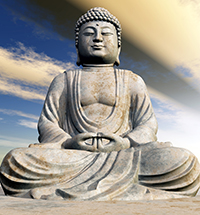 In cases featured in Born Again, we have observed how predispositions, talents and life patterns can repeat from one incarnation to another. Handaka Vijjananda relates to Henry Opukaha’ia due to the many parallels that exist between them, such as:
In cases featured in Born Again, we have observed how predispositions, talents and life patterns can repeat from one incarnation to another. Handaka Vijjananda relates to Henry Opukaha’ia due to the many parallels that exist between them, such as:
- Holy book translation: Henry worked on translation of the Bible into the Hawaiian language. Handaka has translated Buddhist texts into the Indonesian language.
- Creation of a translation dictionary: Henry is credited with the creation of the first dictionary or primer for English/Hawaiian translation. Handaka is creating a similar translation dictionary to facilitate conversion of Buddhist texts written in the Indian Pali language into the Indonesian language.
- Public speaking: Just as Henry gave public speeches to church groups, Handaka gives public presentations on Buddhism and character building.
- Missionary work: Henry was being trained to perform Christian missionary work, though he died before he began to serve as a missionary. Handaka has done missionary work for many years and recently served in Aceh and Medan, Indonesia, where a tsunami struck in 2004.
Handaka notes that the primary difference in the two lifetimes is that he was serving Christianity in his lifetime as Henry, while he serves Buddhism in his contemporary incarnation. He also has a more universal and inclusive point of view, which is characteristic of people who believe in reincarnation.
Reincarnation and Change of Religion
Ahtun Re has revealed that Handaka’s family in Indonesia was also incarnate in Hawaii as the extended family of Henry, some of whom, we learned, suffered violent and cruel deaths. In the reincarnation case of Henry Opukaha’ia | Handaka Vijjananda, we see in microcosm humanity’s path in becoming more spiritually evolved.
Henry was born into a land with tribal war and strict religious rules and taboos. Breaking a taboo could result in persecution and even death. Henry left Hawaii and became a believer in Christianity, a religion that focuses on forgiveness, charity and doing onto others as you would have done to you. Still, Christians are separated from those of different belief systems and wars have been fought based on different beliefs. In contemporary times, Handaka believes in Buddhism, which reveres compassion and embraces reincarnation.
Objective evidence of reincarnation, which demonstrates that we can change religion, nationality, race and ethnic affiliation from one incarnation to another, is the ultimate source of a universal life view.
Let us hope that evidence of reincarnation will spread throughout the world, bringing greater peace and tolerance to the planet. Let us thank Henry Opukaha’ia | Handaka Vijjananda for helping bring evidence of reincarnation to Indonesia.
To review similar cases, please go to:
Spiritual Leader Reincarnation Cases
Evidence and Principles of Reincarnation-Understanding Past Lives
 Physical Resemblance in Reincarnation Cases: There is a similarity in the facial features of Henry Opukaha’ia | Handaka Vijjananda
Physical Resemblance in Reincarnation Cases: There is a similarity in the facial features of Henry Opukaha’ia | Handaka Vijjananda
Past Life Passions and Abilities: The parallels between the talents and accomplishments of Henry | Handaka have been discussed above.
Change of Religion and Nationality through Reincarnation: Henry was raised with the ancient Hawaiian religion and then converted to Christianity. Handaka was born in Indonesia and is a Buddhist.
